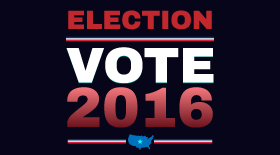California voters agreed with California Chamber of Commerce positions this week, passing CalChamber-supported Propositions 51, 52, 54 and 58, and rejecting Proposition 61. CalChamber-opposed Proposition 53 also was behind in the vote count as Alert went to press.
A record 19.4 million Californians were registered to vote in advance of the General Election, according to the final Secretary of State report before Election Day. Although 100% of precincts have reported their results, there are still millions of votes to count.
Proposition 51
Proposition 51 passed with 54% support.
Proposition 51 authorizes $9 billion in general obligation bonds for new construction and modernizing K–12 public school, charter schools and vocational education, and California Community Colleges facilities.
Proposition 52
With 100% percent of precincts reporting on Thursday morning, Proposition 52 overwhelmingly passed, 69.6% yes to 30.4% no.
Proposition 52 extends indefinitely the existing law imposing fees on hospitals to fund Medi-Cal health care services, care for uninsured patients and children’s health coverage.
The measure extends the current fee program, providing certainty about the availability of federal matching funds (more than $3 billion a year) for hospitals and health care services for children, seniors and low-income families. Proposition 52 also prohibits the Legislature from diverting the money for other purposes without voter approval.
Proposition 53
Opposition to Proposition 53 was running slightly ahead of support in the vote count, 48.5% to 51.5%. Proposition 53 requires a statewide election each and every time the state or a state-local partnership seeks to issue revenue bonds exceeding $2 billion to pay for infrastructure projects.
The CalChamber opposes Proposition 53 because it will stop or delay vital public works projects, encourage litigation and impede the ability to make emergency repairs after a natural disaster.
Proposition 54
Voters agreed with CalChamber, supporting Proposition 54, 64.3% to 35.7%. The measure will prohibit the Legislature from passing any bill unless published on the Internet for 72 hours before the vote and requires the Legislature to record its proceedings and post them on the Internet.
CalChamber President and CEO Allan Zaremberg joined Helen Hutchinson, president of the League of Women Voters of California, and Howard Penn, executive director or the California Planning and Conservation League, in signing the ballot arguments in favor of Proposition 54.
Proposition 55
Voters approved Proposition 55, passing the measure, 62.1% to 37.9%.
Proposition 55 extends by 12 years the temporary personal income tax increases enacted in 2012 on earnings over $250,000, with revenues allocated to K–12 schools, community colleges, and, in certain years, health care.
Proposition 58
Passage of Proposition 58 means schools can more easily offer bilingual programs.
Proposition 58 amends and repeals portions of Proposition 227, the initiative approved by voters in June 1998 to mandate that all children in California public schools be taught English by being taught in English unless parents have gone through a waiver process. Proposition 58 repeals existing law giving parents/guardians standing to sue for enforcement and making public school administrators and teachers personally liable for failing to provide an English-only curriculum. Voters approved this measure, 72.4% to 27.6% with 100% of precincts reporting.
Proposition 61
Leading up to Election Day, the polls showed support for and opposition to Proposition 61 virtually tied. With 100% of precincts reporting, the measure failed, 46.3% to 53.7%.
Proposition 61 would have prohibited the state from buying any prescription drug from a drug manufacturer at prices over the lowest price paid by the U.S. Department of Veterans Affairs (USDVA).
CalChamber opposed this measure because it would have increased what most Californians must pay for health care premiums and out-of-pocket health care costs by shifting the cost of prescription drugs from government purchasers to private payers, including employers. The initiative ignored why the USDVA is able to negotiate lower drug prices and instead used the discounts to establish an artificial market cap for one group of purchasers. The approach would have simply shifted costs to other payers in the system.
Proposition 64
California joined several other states to legalize adult recreational use of marijuana when voters passed Proposition 64, 56% to 44%.
CalChamber did not take a position on the measure, also known as the Adult Use of Marijuana Act. Proposition 64 legalizes the recreational use of marijuana for adults 21 years old and over, imposes a 15% excise tax on marijuana sales and establishes a regulatory framework for the sale of marijuana.
Legalization of marijuana for recreational purposes will be a significant change to current law, but several things will not change, including the ability for employers to maintain a drug- and alcohol-free workplace; employers will be able to continue to maintain and enforce drug-free workplace policies that include marijuana.
For more information, see the Proposition 64 article in this Alert.
More Information
The latest election results are available at the website of the Secretary of State at www.sos.ca.gov.


